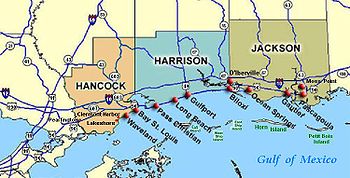
Coastal map of the U.S. state of Mississippi, showing major towns and cities in the 3 coastal counties: Hancock, Harrison, and Jackson County. Also shown are Cat Island, West Ship Island, East Ship Island, Horn Island and Petit Bois Island.The locations of towns, roads and offshore islands are based on NOAA and NASA maps. (Photo credit: Wikipedia)
BY DAVID WILLIAMS
Mississippi will receive $1.5 billion as part of its settlement from the British Petroleum oil spill. A new plan proposes to use a significant portion of that settlement to build a government-owned broadband “fiber ring” connecting several South Mississippi cities including Biloxi, Gulfport and D’Iberville. Biloxi Mayor Andrew “FoFo” Gilich said the total cost of the network, which officials hope will eventually encompass 12 cities and three counties, could top $100 million.
While broadband service is an important tool for students, business owners, job seekers, public safety and health care professionals, spending the BP settlement money on a network owned and managed by the cities is a waste of public funds and puts taxpayers on the hook for future financial exposure. And it is hard to imagine that residents in Biloxi will tolerate the delays the Fiber Ring installation will cause in the current infrastructure projects on the Point. Continue reading





